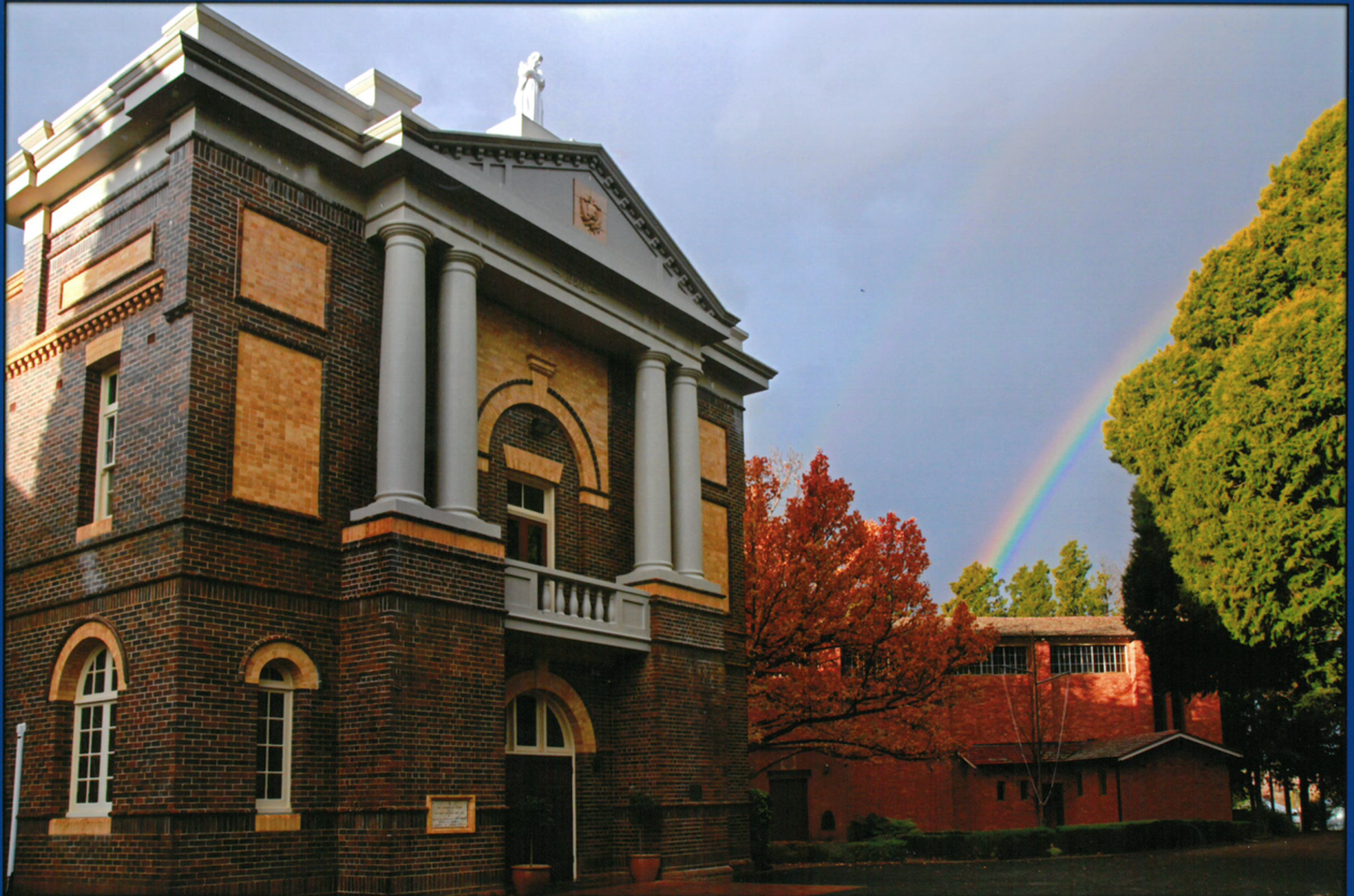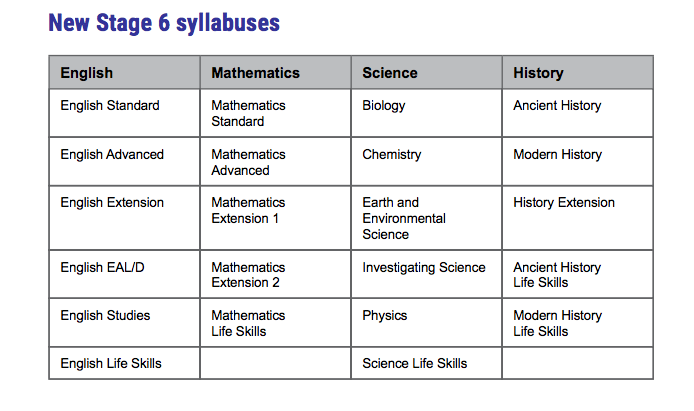Assistant Principal's Report

NEW STAGE 6
SYLLABUSES AND
ASSESSMENT from 2018
Which Stage 6 syllabuses have changed?
New syllabuses for Stage 6 (Years 11–12) English, Mathematics, Science and History have been
developed using the established NSW Education Standards Authority (NESA) syllabus development process. These syllabuses include Australian curriculum content and reflect the new directions of the Stronger HSC Standards reforms.
The Stronger HSC Standards reforms include:
- supporting the achievement of high minimum standards for all students
- ensuring the flexibility and versatility of the Higher School Certificate (HSC) to cater for the full range of students
- encouraging every student to achieve at their highest possible level
- a focus on the acquisition of deep knowledge, understanding and skills for students.
What are the features of the new syllabuses?
Many features of current syllabuses have been retained. Some new features include:
- Australian curriculum content identified by codes
- opportunities for depth over breadth of learning, including new technologies and contemporary approaches to learning
- Learning across the curriculum content, including cross-curriculum priorities and general capabilities
- publication in an interactive online format
- an interactive glossary.
How do Stage 6 syllabuses cater for all students?
NSW Stage 6 syllabuses are inclusive of the learning needs of all students. The syllabuses
accommodate teaching approaches that support student diversity, including students with special
education needs, gifted and talented students and students learning English as an additional language or dialect (EAL/D).
What are the changes to assessment?
The Stronger HSC Standards reforms provide new directions for assessment practices in all
Stage 6 courses to:
- rebalance the emphasis on assessment to allow more time for teaching and learning
- maintain rigorous standards
- provide opportunities to assess students’ depth of knowledge and their conceptual, analytical and problem solving skills.
School-based assessment requirements for all Board Developed Courses (excluding VET, Life Skills and Content Endorsed Courses) will change from 2018.
These changes include:
- mandated components and weightings for Year 11 and Year 12
- capping the number of school-based assessment tasks to three in Year 11 and four in Year 12 specified minimum and maximum weightings for formal tasks
- a variety of tasks to assess student knowledge, understanding and skills.
Students will continue to undertake:
- course-specific formal school-based assessment programs
- a range of assessment task types such as tests, written assignments, oral presentations, digital
- submissions, practical activities, fieldwork and projects
- course-specific external assessment, such as the HSC examinations or submitted works.
What is informal assessment?
Informal assessment includes activities undertaken and anecdotal evidence gathered
throughout the teaching and learning process in a less prescribed manner than formal
assessment. Informal assessment can provide evidence for teachers and inform feedback to
students in relation to improving their learning. Informal assessment may include a range of
strategies such as questioning, class discussion, observations and student self-evaluation.
What is formal assessment?
Formal assessment tasks are those which students undertake as part of the school-based
assessment program, reflecting specific course requirements, components and weightings. School-based assessment provides opportunities to gather evidence about student achievement of syllabus outcomes in different ways to HSC examinations. Evidence gathered through formal assessment assists teachers to report on student achievement at a point in time, and is often used for grading or ranking purposes.
It is important that students are familiar with the course requirements and school policies and procedures for formal assessment.
How does the formal assessment program contribute to the Record of School Achievement (RoSA)?
For each student who completes a Stage 5 and Stage 6 course (except Life Skills and VET courses), the school awards a grade representing each student’s achievement against statewide standards. The grade is submitted to NESA and recorded on the RoSA. The RoSA is a cumulative credential received by students who leave before the completion of HSC examinations.
Students are able to access an eRecord of their grades at any time through their Students Online account.
How does the formal assessment program contribute to the HSC credential?
At the conclusion of the Year 12 course, the school will submit an assessment mark to NESA for each student’s performance in a course. This mark is based on the formal school-based assessment program.
The mark is adjusted (moderated) by NESA to produce the assessment mark that appears on HSC results. For each course, the final HSC mark is a 50:50 combination of the HSC examination and school-based assessment mark.
How are students undertaking Life Skills courses assessed?
Students undertaking Life Skills courses will study selected outcomes and content informed by a collaborative curriculum planning process. Assessment should provide opportunities for
students to apply their knowledge, understanding and skills to a range of situations or environments. Students undertaking Life Skills courses are not required to complete formal assessment tasks. Teachers are best able to determine the progress of the student.
Students may demonstrate achievement in relation to Life Skills outcomes independently,
with adjustments or with support. The type of adjustments and support will vary according
to the particular needs of the student and the requirements of the activity.
What credential will your child receive on completion of Stage 6?
If your child completes the Year 12 program, including course and assessment requirements,
they will receive the Higher School Certificate. Typically, each course report contains:
- an assessment mark derived from the mark submitted by the school and produced
- in accordance with NESA requirements for the school-based assessment program
- an examination mark derived from the HSC external examination
- an HSC mark, which is the average of the assessment mark and the examination mark
- a performance band, determined by the HSC mark.
If your child satisfactorily completes a Life Skills course, the course is listed on the Record of Achievement (RoA) with the annotation Refer to Profile of Student Achievement.
The Profile of Student Achievement provides details of the specific Life Skills syllabus outcomes
NAPLAN
University Dangers
A recent article in the SMH is relevant to our school leavers. The article written by Tracie Winch commented on the drop out rates of first year university students. The journalist went on to critique the role schools played.
‘In a similar way, schools do very little to explain university or help year 12s better transition to it. …Small wonder so many first-years flounder, disengage or drop out, regardless of the school system that plonked them on the conveyor belt.’
There is no doubt that in some cases this is true and there are many reasons why this happens. From our own students experiences there are many reasons for leaving university before completing a course. Many students find that what they were anticipating in the course did not meet their expectations or students changed their career aspirations mid course to pursue an alternate pathway. In contrast to this we have evidence from past students who have excelled beyond even our expectations at University.
It is the case that the majority of our HSC graduates go on to University. Across Australia there has been over the past five years a massive 40 per cent drop-off in students undertaking government-subsidised apprenticeships and traineeships.
What parents need to be aware of is their own children’s abilities academically, there work ethic and being informed about the requirements for particular courses. For example if 3rd Year physics is a requirement of a course yet a student has not completed any study of physics than this would necessitate a conversation around how they can achieve success.
Many universities offer early-access schemes and discounted ATAR score entries, with some courses enrolling students with ATARs in the 30s. This is a trap that some students and parents will fall into as some universities encourage students to enrol in courses regardless of their prospects of finishing.
Overall, one in five will drop out, but in some universities the figure is much higher. Often it's the lower socioeconomic students who are the victims, but by no means is this just a class problem.
I believe we do set our students up for success at University. We have information nights explaining UAC and ATAR and a dedicated Careers advisor who is only too willing to support our students. Students have experience at on line learning and we have placed a greater emphasis on a collaborative approach to learning as well as peer assessment. We actively encourage independent learning and for students to monitor their own learning. Above all resilience and well- being is the key. Students need to be able to adapt to the learning styles away from the confines of the school. Our Pastoral Academic Care and well-being program supports our students self-efficacy and strengthens resolve.
Thank you
Simon Fleming


